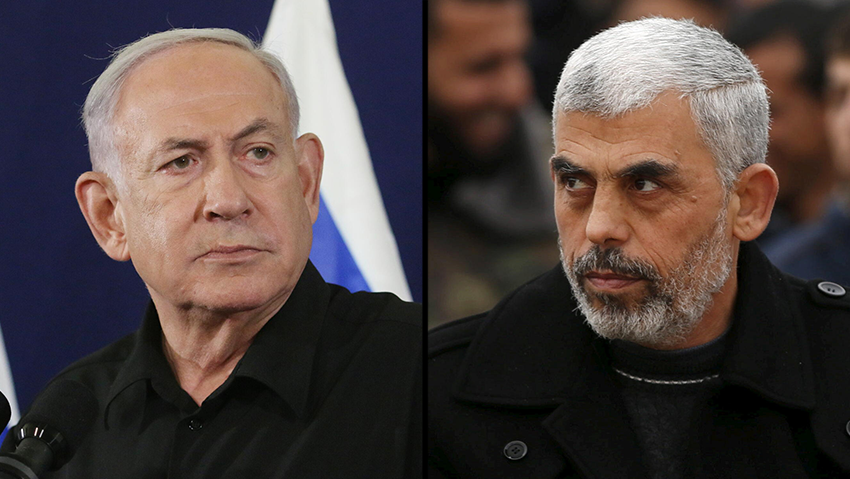Getting your Trinity Audio player ready...
The White House called on Hamas Monday evening to send negotiators to the summit scheduled for Thursday, which the mediators including the U.S. initiated in an attempt to restart the talks on a hostage deal and a cease-fire in the hope of reaching an agreement soon, in order to end the war in Gaza but also to reduce regional tensions in the shadow of Iran and Hezbollah's threats of revenge against Israel for recent assassinations.
The call also comes at the same time as a report that U.S. Secretary of State Antony Blinken will travel to the Middle East on Tuesday amid high tensions in the region, by Axios reporter Barak Ravid, who cited an unnamed source. The report said Blinken has stops planned Israel, as well as in Qatar and Egypt, which are both mediators in the current negotiations.
Hamas announced Sunday night that it does not intend to send representatives to the summit, leading the White House's National Security Council spokesman John Kirby to tell reporters on Monday evening that: "The meeting is still scheduled for Thursday the 15th. We fully expect that those talks are going to move forward, and they need to move forward. All negotiators should return to the table and bring this deal to a close. It’s time to do that. The details are of such a nature that we think they can be hashed out."
He also addresses Hamas specifically. "More critically, it’s time for Hamas to release the hostages – which, of course, include American citizens – and help us all bring some relief to the people of Gaza. They say they care about the people of Gaza; they say they care about the Palestinian people. One way to prove that is to sign up to this deal, show up, close it, and let’s get it done."
He added that the American expectation is that the talks will "progress further" despite the various reports and statements.
Earlier, a spokesman for the U.S. State Department, Vedant Patel, also commented on the Hamas statement: "We expect these talks to progress, I will not comment on the reports, but it is time for all parties to return to the table to finalize the deal."
At the same time, and in the shadow of U.S. efforts to promote a deal as well as an international coalition to defend Israel out of fear of attacks from Iran and Hezbollah, the White House announced that U.S. President Joe Biden spoke on Monday with the leaders of Great Britain, France, Germany and Italy to discuss tensions in the Middle East. He reportedly urged the leaders "to repeat what they said before in terms of reaffirming the defense of Israel, and the need to achieve a cease-fire, return the hostages home and send a strong message that we do not want to see any violence and any attacks by Iran or its proxies."
2 View gallery


Antony Blinken is reportedly returning to the region on Tuiesday
(Photo: Mark Schiefelbein / AP)
Hamas justified its decision not to send representatives on its behalf to the summit by saying that additional rounds of negotiations only prolong the war and give Israel legitimacy. The Israeli negotiating team were not moved by the Hamas announcement, and noted that this is part of the tactic to reach achievements, and that until the summit is held, the psychological warfare will continue.
“We call on mediators to present a plan for implementing what was agreed upon on July 2, rather than engaging in new negotiations," Hamas said in a statement. "Additional rounds of talks or new proposals only serve to cover up the occupation’s aggression and give it time to win its war of extermination.”
Senior Hamas official Osama Hamdan told Hezbollah’s Al-Manar TV that: “There are ideas presented by the mediators that we have accepted, and we are ready to implement them immediately. It is unacceptable to give the enemy more time. Our position is clear, and we are not waiting for discussions on new frameworks or headlines.”
Hamdan added: "There is an outline that we have agreed to, and we are waiting for the announcement of implementation mechanisms that include stopping the war and an Israeli withdrawal, providing aid and starting to rebuild. The Israelis want to escape from the obligation to cease fire, and there is a wrong assessment among Israelis that the resistance is in a weak position. The reality on the ground confirms that it is fighting as it has in the past."
Gaps in the issue of the terrorists to be released
Last week, Israel sent a clarification document to the mediators, which was passed on to Hamas. Both sides are now working around the clock with the mediators to close all gaps – such as the status of the Philadelphi Route, the Rafah crossing, troop movements and the cease-fire – aiming to reach Thursday with a framework that could lead to a deal within a few days.
Israel insists on the release of 33 specific hostages. In the clarifications sent by Hamas, the terror group asked Israel to drop its veto to allow Hamas more flexibility in deciding which Palestinian prisoners would be freed from Israeli jails. However, Israel has made it clear that it will insist on receiving a list of hostages to be released in advance.
The clarification document is critical, and progress cannot be made without it. Additionally, there is no way to reach a hostage deal without resolving issues related to the Philadelphi Route and Rafah, as well as confirming the list of hostages. The goal is to address these key issues before the summit to ensure the talks are productive and a deal can be implemented within a few days.



